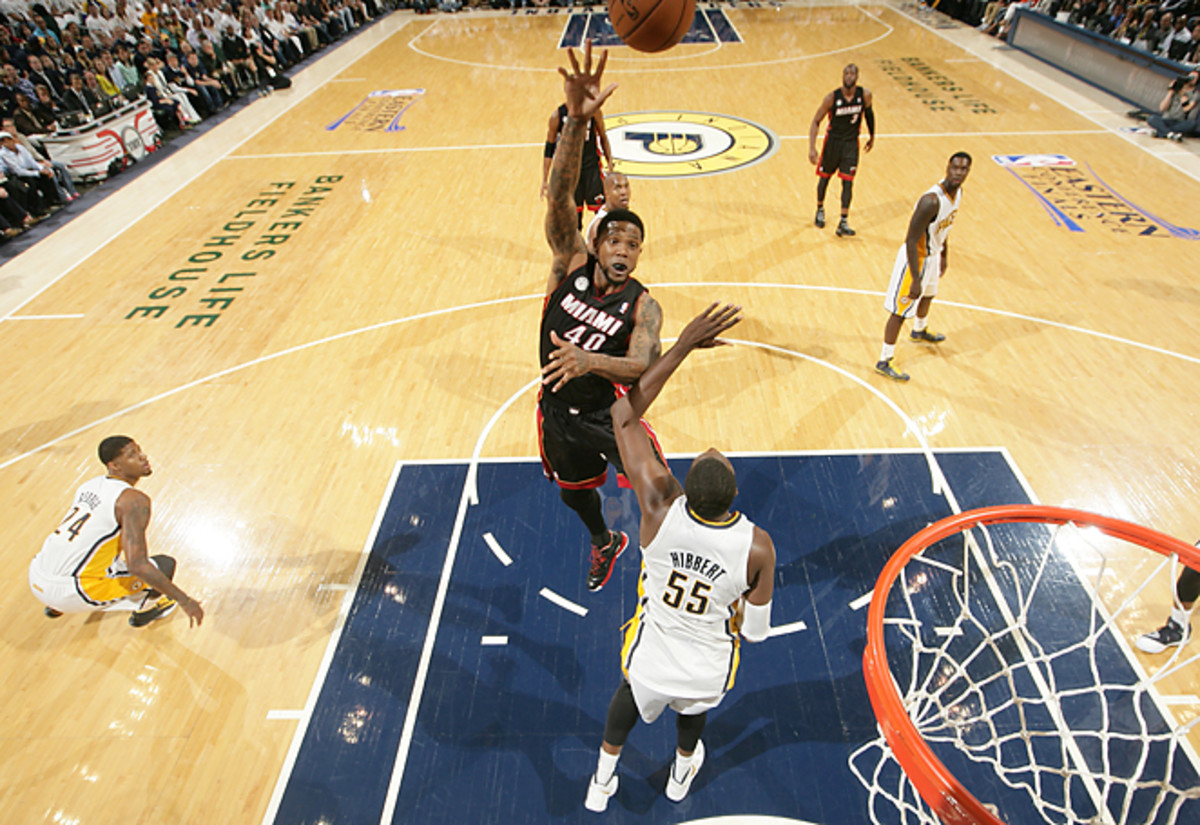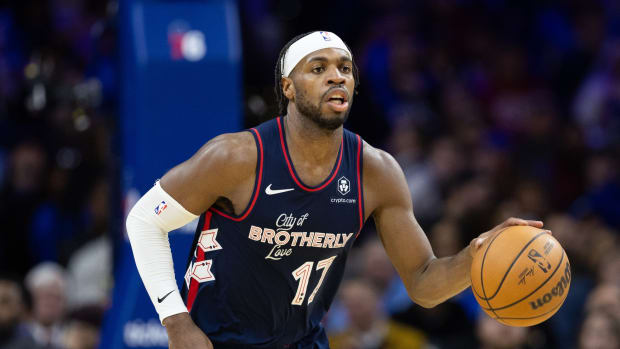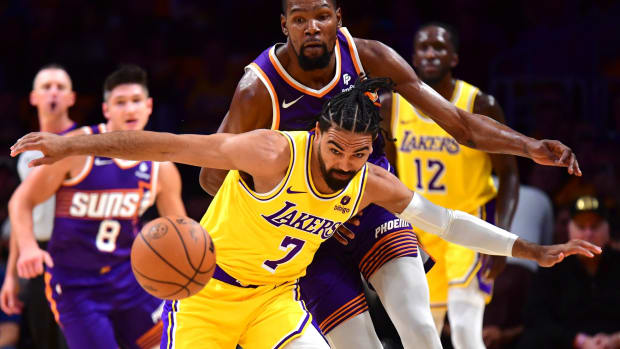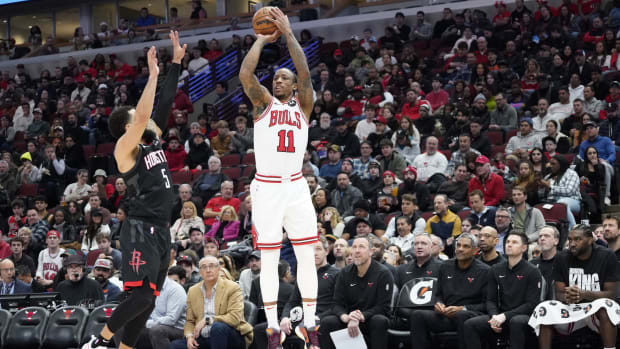Heat test Pacers' inside edge and ace Game 3
INDIANAPOLIS -- How times have changed. One year ago, the Heat were losing Game 3 in this building to create doubt for their promised dynasty. One year later, they were regaining homecourt advantage to put themselves back on course for a second promised championship. Which, if memory serves correct, would leave only five more to go.
Based on their play Sunday, all things seem possible for the defending champs. Throughout recent weeks of blasé playoff outings, coach Erik Spoelstra had been asking his Heat for a higher level of execution and focus. On Sunday, they gave it to him in the form of a 114-96 win in Game 3 of the Eastern Conference finals that restored Miami to a 2-1 series lead. Against the league's top-rated defense, built around the dwarfing size that had locked down the paint over the opening two games and extended its long reach out to the three-point line, the Heat shot 62.8 percent (27 for 43) in the opening half to put the game all but out of reach.
The lead was 14 points at intermission, and by then, the Pacers had been relieved of the defense-first identity they'd established over the first two games. The 70 points Miami scored were a franchise playoff record, and its single turnover -- a traveling violation by Ray Allen -- tied another Miami record for a postseason half. The scoring was balanced with LeBron James backing into the post to set up his game-high 22 points, but the tipping point hinged with the 8-for-9 shooting of power forward Udonis Haslem.
Haslem had gone 1-for-7 while Miami split Games 1 and 2 at home. "The first two games, I was cutting to the basket, and then when you get to the basket, obviously, you get swallowed up by their size," said Haslem, who generated a most efficient 18 points and seven assists in Game 3. "So I stayed a little bit more spaced tonight."
The Heat found Haslem for three early conversions from the elbow, like a well-managed spread offense finding the tight end in the seams. Over the first two quarters, Haslem (6-for-6 in that span) and backup Chris Andersen took turns making their first nine shots from the field. "He was hitting a lot of shots that he normally wasn't hitting," said Pacers center Roy Hibbert of Haslem. "He was letting me hear it."
And why not? No one is going to beat the Heat when they're generating an overall assist-to-turnover ratio of 21-5 and Haslem is turning 18-footers into gimmes. "Him hitting those shots really made us have to think on defense -- who do we guard?" Hibbert said. "Do we guard the paint, or do we have to go out to the shooters out in the corner? Our game plan was to limit those [role] guys, make sure they got nothing and let their Big Three do all the work. And he was the one that really pushed them over the edge."
While Haslem was loitering on the corners of the offense, James was squeezing himself into the block. "It was something we wanted to get to help settle us and get into a more aggressive attack," Spoelstra said. It was James' forceful response to the two last-minute turnovers he committed to lose Game 2. He created showdowns down low against defender Paul George, and the best man won -- in part because Indiana's big men weren't helping George.
"I saw I had a one-on-one matchup," James said. "They didn't come down in the post [to double-team] all game, so I just tried to take advantage of it. My teammates gave me space."
And so the emerging duel with young George was cut short by James, who led everyone with an impact of plus-22 points. George had a minus-17 impact while going 3-for-10 with five turnovers and eight assists.
The talk that Miami would have no answer for Indiana's size is now moot. As usual, when it really matters, the mismatches are created by the Heat rather than inflicted upon them. Hibbert (20 points and 17 rebounds), David West (21 points, 10 rebounds) and point guard George Hill (19 points) had big games, and it mattered hardly at all. "I have to play both," said Hibbert of the threats of Haslem on the wing and James in the paint. "I have to stop the roll guy and get out and contest. It's going to be a hard job, but if we want to win the series, I have to do both. I have to do everything and make it more uncomfortable for those guys."
This was the first game (and probably not the last) in which Miami established the terms. When Shane Battier made a pair of free throws for a 38-30 lead in the 14th minute, the Heat had their largest lead in the series.
Their quartet of floor-spacing shooters -- Allen, Battier, Mario Chalmers and Norris Cole -- had made 4-of-20 threes in the two games at Miami, and James had promised to involve them from the start of Game 3 in order to make them feel more comfortable. The ensuing ball movement had the Heat offense running smoother than the engines at the Indianapolis 500 a few hours earlier in the day. When Allen helped finish the half by circling around the baseline and looping up to the right elbow for a smooth catch-and-shoot three -- his first such attempt of the game, and only his second conversion of the series -- the world made sense for Miami once more.
If you looked at the bottom half of the stat sheet at intermission, you would have assumed Miami was in trouble: The Pacers were shooting 50 percent from the field with 16 free throws, only six turnovers and 11 points or more from West, Hibbert and Hill. Yet their offense was overburdened. They could neither generate enough stops nor create enough scoring to keep up.
The Pacers made a third-quarter run, but couldn't pull closer than seven, twice, and briefly. When the Heat needed a basket, they worked the ball around the horn to finish another midrange jumper for Haslem, as sure as Tinkers to Evers to Chance. The middle was wide open -- yes, Hibbert was in the game -- and Dwyane Wade (18 points and eight assists) drove through it like he was pulling a prank. Afterward, he hopped around like one of those guys who runs out of the stands across a football field before the security guards can catch up to him.
"When you win, a lot of things are masked," said Wade of the Heat's 49-3 roll since early February that had been knocked off stride by their last-minute loss in Game 2 on Friday. "But once you lose, you get to break down everything. I think our attention to detail coming off a loss is a lot better."
The problem with this win, from the perspective of the Pacers, is that there weren't many Miami problems being masked. Unless Hibbert can figure out a way to be in two places at once, the promise of a tight series may give way fast in Game 4 on Tuesday.




































